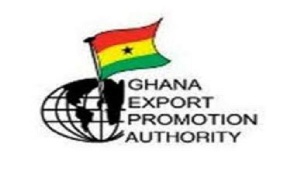 Ghana Export Promotion Authority logo
Ghana Export Promotion Authority logo
The Ghana Export Promotion Authority (GEPA) on Wednesday launched the Buyer Portal of the Market Hub to serve as a unique one-stop shop with resources and information on international trade for exporters.
The portal would address various market access issues that confront the export community and ensure integration, dialogue, relationship building and simplicity between exporters and buyers.
It would enable exporters to easily find buyers and suppliers for their products, ensure market accessibility, know critical market access requirements, certification and standards, as well as stay tuned into international trade news and events and showcase their companies’ through the online exporter directory.
Interested exporters could access the portal through www.gepaghana.org which is designed to provide useful links and information on exporter companies to potential importers globally.
Mr Carlos Kingsley Ahenkorah, a Deputy Minister of Trade and Industry, who launched the portal at the 78th National Exporters’ Forum in Accra, urged the managers of the online platform to ensure that patrons made their request in compliance with user-policy as quickly and painlessly as possible
The Deputy Minister also out-doored the GEPA 2017 Non-Traditional Export Statistics, which provided insight into the country’s earnings and performance on non-traditional exports (NTEs) like cocoa products, fruits, vegetables, creative arts and crafts, cashew nuts, medicinal plants and others from January to December last year.
Statistics from NTEs earnings showed that the nation received $2.557 billion in 2017, representing an increase of $3.8 per cent compared to the $2.463 billion in 2016.
The analysis of the statistics on the NTEs for the past five years (2013-2017) showed that the sector grew at an annual average of 1.22 per cent and contributed 18.37 per cent to the total national merchandise exports in 2017.
Mr Ahenkorah said exporters played an indispensable role in the economy through influencing the level of economic growth, employment and the balance of payments.
He said the Ministry had outlined a number of strategic interventions, which included; the National Industrial Revitalisation Programme with a stimulus fund of $200 million to support distressed but commercially viable companies, the One District, One Factory Initiative and the Export Development and Diversification Programme.
He explained that the Export Development and Diversification component of those initiatives espoused the need to evolve a clear national exports strategy aimed at diversification, competitiveness, and the development of more export markets for an expanded range of products.
Mr Ahenkorah observed that the various trade policies implemented by the Government had enabled trade activities to increase in the past few years, noting that the economy grew from 3.7 per cent in 2016 to about 8.3 per cent in 2017, and it is expected to further grow by the end of this year.
He said the implementation of the National Single Window (GNSW) and subsequent roll out of the paperless ports system had cut down the time for business transactions at the port.
“The best trade facilitation processes regime has become the hallmark of this government’s administration. We’re working hard to further improve efficiency at the port,” he emphasised.
The Deputy Minister stated that the transformative policies implemented by the Government had seen sustainable increase in the ranking of Ghana in the World Bank Trade across border Report, rising 13 places from 167th in 2016 to 154 position in 2017.
The increase in the country’s ranking, he said, could be attributed to the reduction in the time and cost of import procedures from two weeks to 48 hours and 50 dollars respectively, per consignment.
Similar improvements, he said, were registered in the World Bank Logistics Performance Index (LPI), where Ghana rose 12 places from 100th in 2014 to 88th position in 2016, the highest improvement since the survey was launched in 2017.
Mrs Afua Asabea Asare, the Chief Executive Officer of the GEPA, in an earlier address, said the National Exporters Forum since its inception in 1987 had served as a suitable platform for interaction between exporters and other stakeholders.
It has also helped to identify and address constraints in the non-traditional export sector and had been an avenue to inform exporters and stakeholders about export activities and programmes in the NTE sector for the year.
Mrs Asabea Asare mentioned some strategic interventions being implemented to increase the contribution of the NTEs to the country’s economic growth, including; the National Export Strategy aimed at developing potential of the NTEs sector to enable it to make maximum contribution to the Gross Domestic Product (GDP).